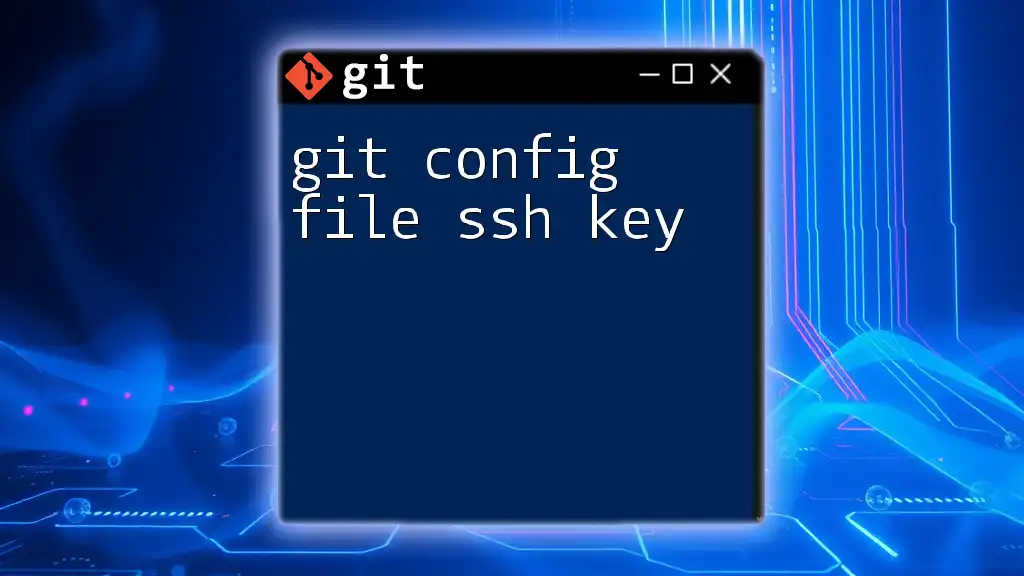Managing multiple SSH keys in Git allows you to authenticate with different accounts or services by configuring your SSH config file, ensuring seamless access to multiple repositories without constantly switching keys.
Here's how to set it up:
# Add multiple SSH keys to the SSH config file
echo "Host github.com-username
HostName github.com
User git
IdentityFile ~/.ssh/id_rsa_username" >> ~/.ssh/config
echo "Host github.com-anotheruser
HostName github.com
User git
IdentityFile ~/.ssh/id_rsa_anotheruser" >> ~/.ssh/config
What Are SSH Keys?
SSH keys are a pair of cryptographic keys used to authenticate secure connections over the network, specifically in situations like accessing Git repositories. When you initiate a connection to a server (like GitHub or GitLab), the server uses your public key to verify your identity, allowing for a secure interaction without needing to transmit a password. This process enhances security and eliminates the risk of exposing your credentials.
Benefits of Using SSH Keys
Using SSH keys provides significant advantages over traditional password authentication. They allow for:
- Enhanced Security: SSH keys are much harder to crack compared to passwords, significantly reducing the risk of unauthorized access.
- Streamlined Workflow: Once configured, SSH keys can facilitate a smoother experience by eliminating the need to enter your password for every repository interaction.

Reasons for Having Multiple SSH Keys
Having multiple SSH keys can be particularly beneficial for several reasons:
- Managing Different Identities: If you work with various teams or projects, using separate keys helps maintain distinct identities. This prevents mixing personal and organizational work.
- Collaboration Across Organizations: When collaborating with different entities, each may require separate credentials, making it crucial to have distinct keys.
- Handling Multiple Git Hosting Services: If you use various Git hosting platforms (like GitHub, GitLab, or Bitbucket), having multiple keys ensures that each account remains secure and compartmentalized.

Generating Multiple SSH Keys
Step-by-Step Guide to Generate SSH Keys
Before you start generating SSH keys, ensure you have Git and SSH installed on your machine.
Command to Generate a New SSH Key
To generate a new SSH key, you’ll use the following command in your terminal:
ssh-keygen -t rsa -C "your_email@example.com"
- Here, the `-t rsa` indicates the type of key to create, while `-C` allows you to add a comment (usually your email) for easier identification later.
Naming SSH Keys Appropriately
When creating multiple keys, it’s essential to name them appropriately. A clear naming convention helps you quickly identify which key corresponds to which service or project. For instance:
- Use `id_rsa_github` for your GitHub key.
- Use `id_rsa_gitlab` for your GitLab key.
Example: Generating Keys for GitHub and GitLab
Here’s how you might generate keys for both GitHub and GitLab:
ssh-keygen -t rsa -f ~/.ssh/id_rsa_github -C "your_email@github.com"
ssh-keygen -t rsa -f ~/.ssh/id_rsa_gitlab -C "your_email@gitlab.com"
In this example, the `-f` option specifies the filename to save the key, ensuring that each key is stored in its own distinct file.

Adding SSH Keys to the SSH Agent
Starting the SSH Agent
Before you can use your new SSH keys, you need to ensure the SSH agent is running. You can start it with the following command:
eval "$(ssh-agent -s)"
This command initializes the SSH agent process that handles your keys.
Adding Your SSH Keys
Once the agent is running, add your SSH keys with:
ssh-add ~/.ssh/id_rsa_github
ssh-add ~/.ssh/id_rsa_gitlab
This will allow the SSH agent to manage these keys for authentication.
Verifying Added Keys
To verify that your keys have been added successfully, run:
ssh-add -l
This command lists the keys currently managed by the SSH agent, confirming that your keys are ready for use.

Configuring SSH for Multiple Keys
Understanding the SSH Config File
The `~/.ssh/config` file is a local configuration file that allows you to define settings for different hosts, including which SSH key to use for each.
Example Configuration
To manage multiple SSH keys effectively, you can create or modify your SSH config file as follows:
Host github.com
HostName github.com
User git
IdentityFile ~/.ssh/id_rsa_github
Host gitlab.com
HostName gitlab.com
User git
IdentityFile ~/.ssh/id_rsa_gitlab
In this configuration:
- Host specifies the nickname you will use to reference the server.
- HostName indicates the actual hostname of the server.
- User defines the username for the connection.
- IdentityFile points to the specific SSH key associated with that host.
Common Errors and Troubleshooting
When managing multiple SSH keys, you might encounter common pitfalls:
- Incorrect Identity Being Used: Ensure that your SSH config file is correctly set up, as having no config or incorrect file paths will lead to the default key being used.
- Permission Issues: Make sure your `~/.ssh` directory and its contents have the appropriate permissions. All files should ideally have permissions set to `600` (read/write for user only).

Using Multiple SSH Keys with Git
Cloning Repositories with Different Keys
When working with repositories that require different SSH keys, it’s important to use the correct SSH URL. This ensures that Git uses the right key for authentication.
Example of Cloning a Repository
Here’s how you might clone a repository:
git clone git@github.com:username/repo.git
git clone git@gitlab.com:username/repo.git
In these examples, Git will automatically refer to the SSH config file to determine which key to use based on the host specified.

Managing SSH Keys Across Different Systems
Exporting and Importing SSH Keys
If you need to transfer your SSH keys to another system, make sure to copy the `.ssh` directory securely. This often involves using secure copy commands or encrypted drives, to maintain your keys' confidentiality.
Best Practices for Managing Your SSH Keys
Regularly auditing your SSH keys is a sound strategy. Remove any keys that are no longer in use and ensure that only the necessary keys are accessible. Additionally, consider revoking keys that you suspect may have been compromised.

Conclusion
Managing multiple SSH keys in Git can seem daunting, but it is crucial for maintaining security and efficiency, especially for developers working with multiple projects or organizations. By properly generating, configuring, and utilizing SSH keys, you can streamline your workflow and enhance the security of your Git operations. Embrace these practices and transform how you manage your Git interactions for the better.

Additional Resources
For further reading, consider checking the official Git documentation on SSH and SSH key management, as well as identifying tools designed for managing SSH keys visually. These resources will aid in deepening your understanding of secure Git practices and efficient workflows using multiple SSH keys.
















